人教英语七年级下册Unit11 How was your school trip ?Section A 1a- 2d课件+嵌入音视频 (共35张PPTWPS打开)
文档属性
| 名称 | 人教英语七年级下册Unit11 How was your school trip ?Section A 1a- 2d课件+嵌入音视频 (共35张PPTWPS打开) | 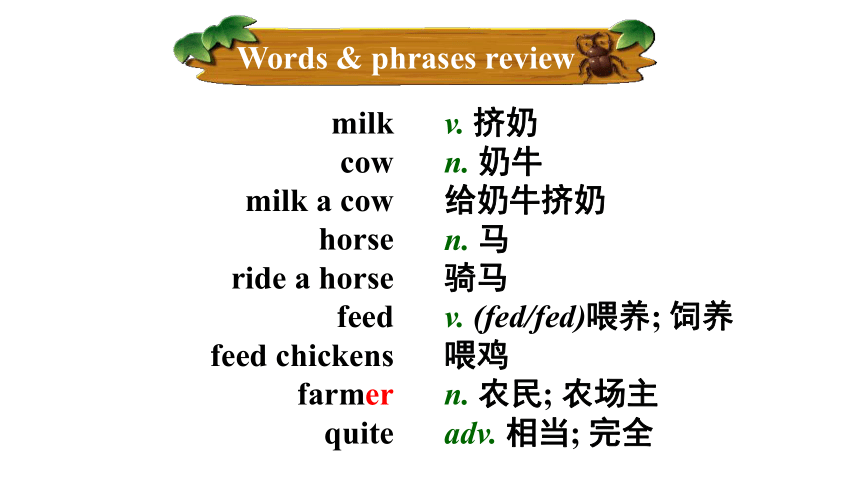 | |
| 格式 | zip | ||
| 文件大小 | 37.8MB | ||
| 资源类型 | 教案 | ||
| 版本资源 | 人教新目标(Go for it)版 | ||
| 科目 | 英语 | ||
| 更新时间 | 2020-06-29 20:55:34 | ||
图片预览

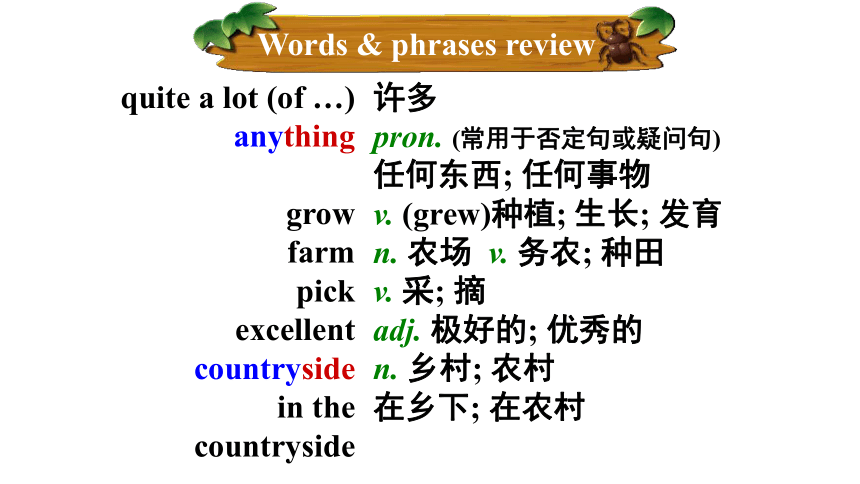
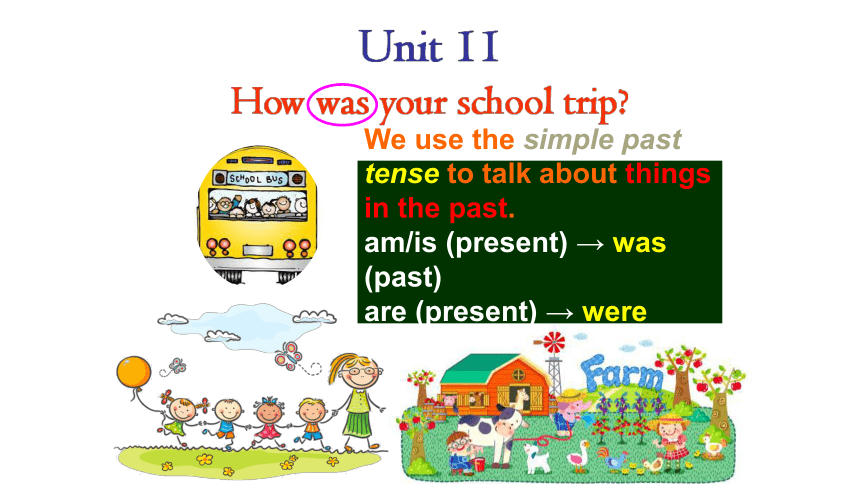
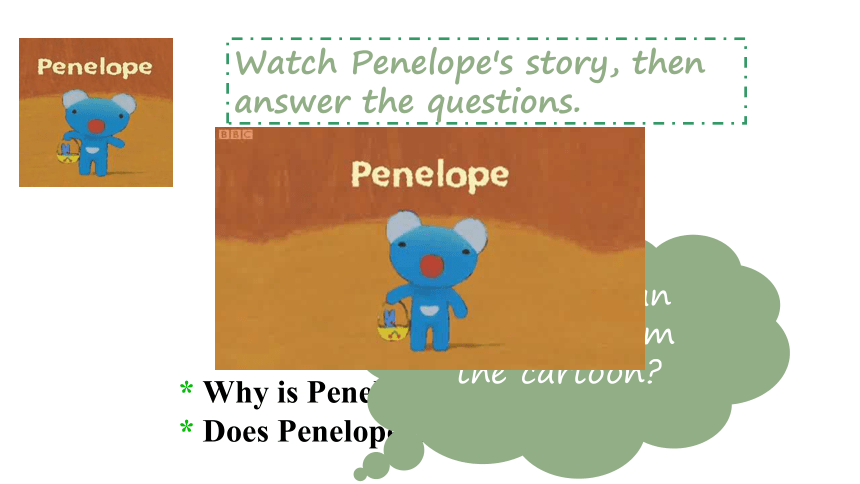
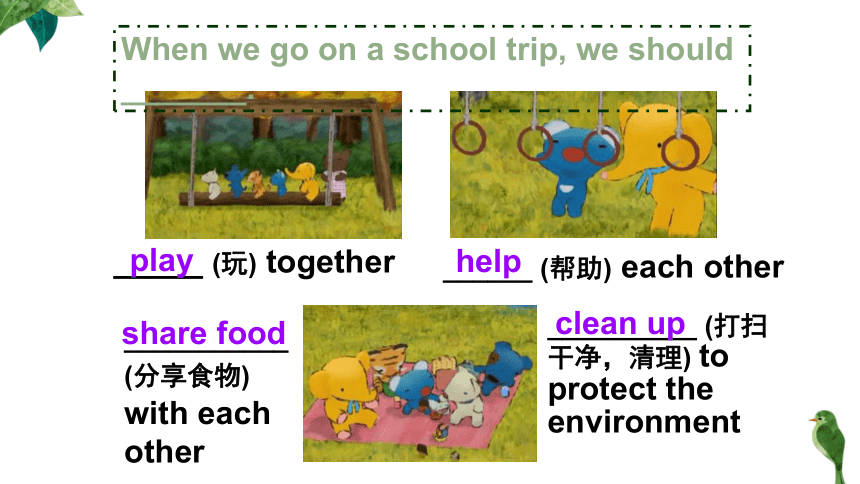
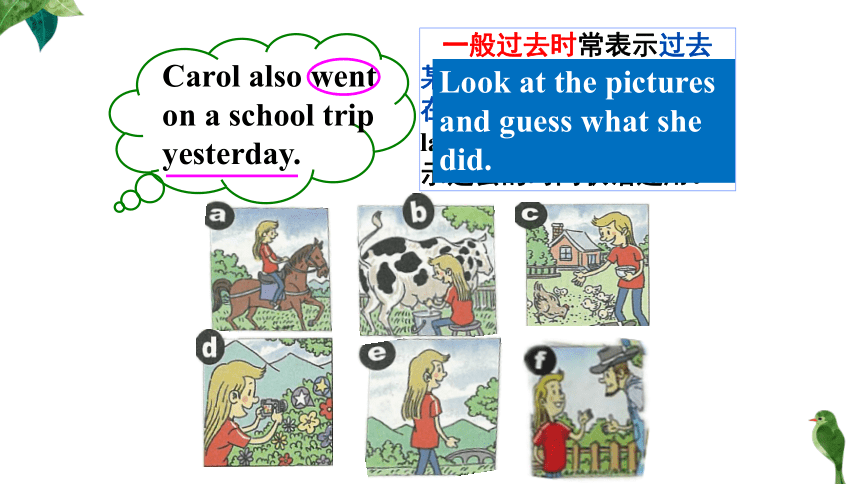
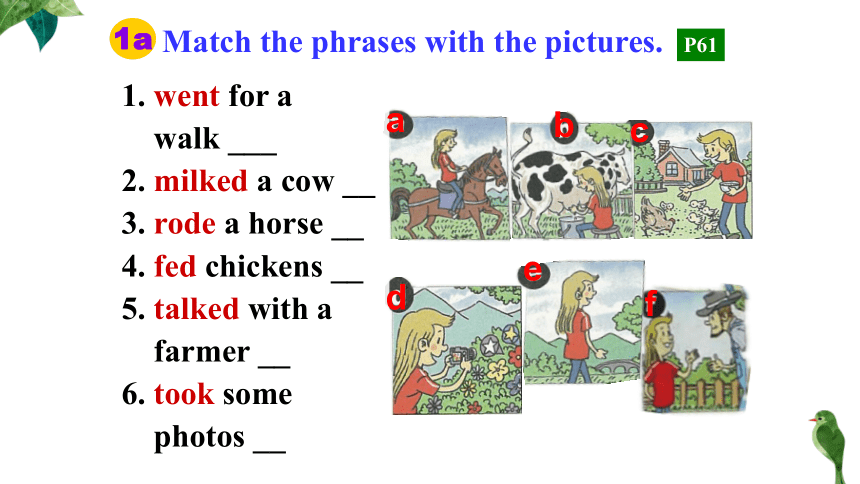
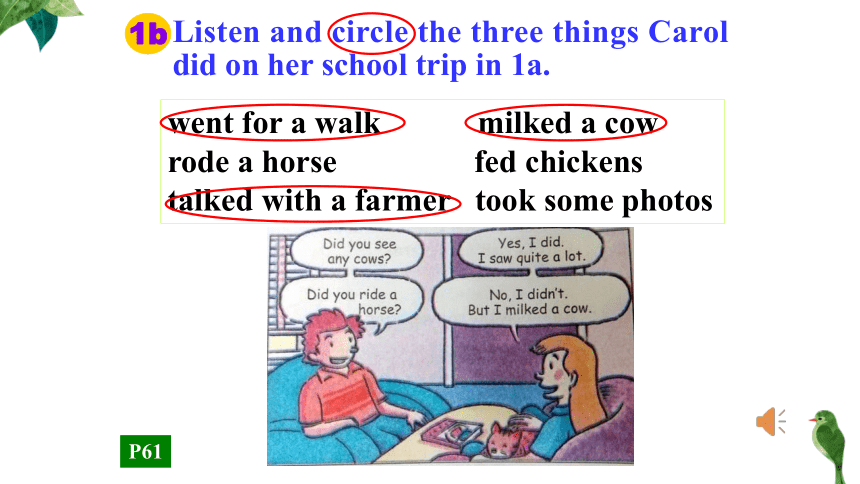
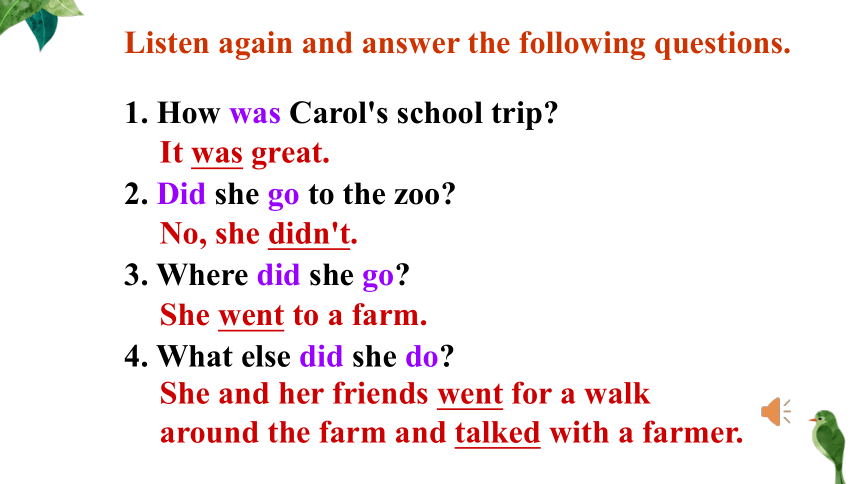
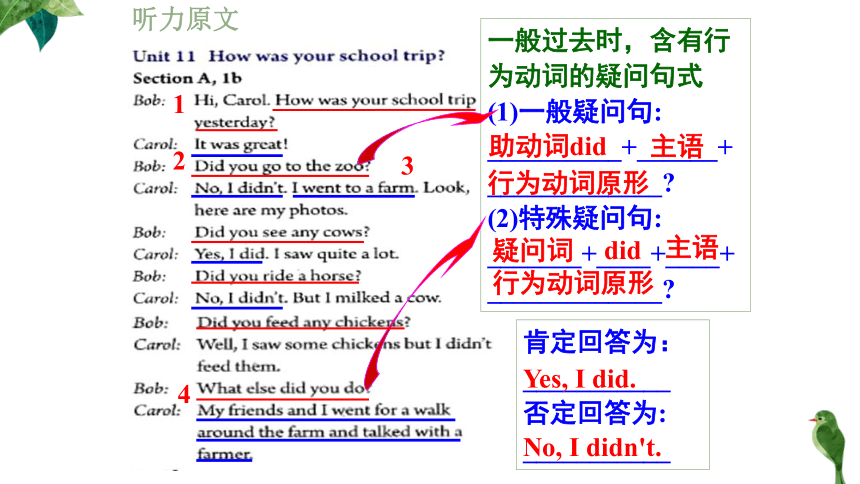
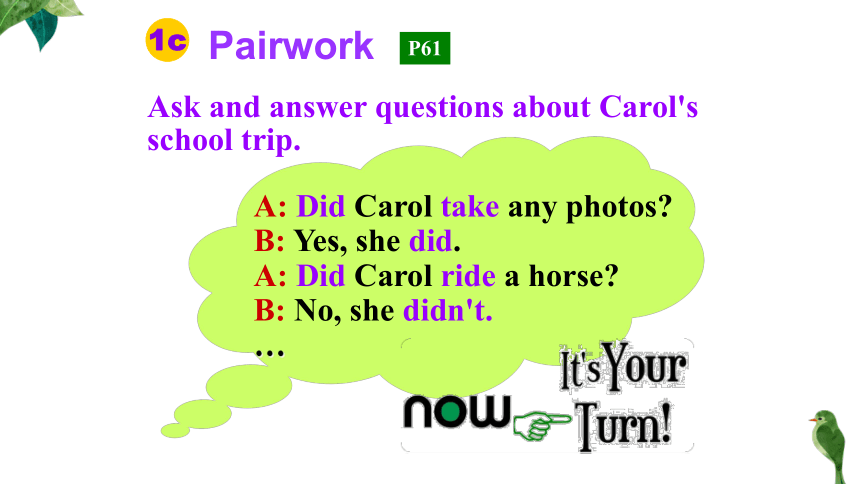
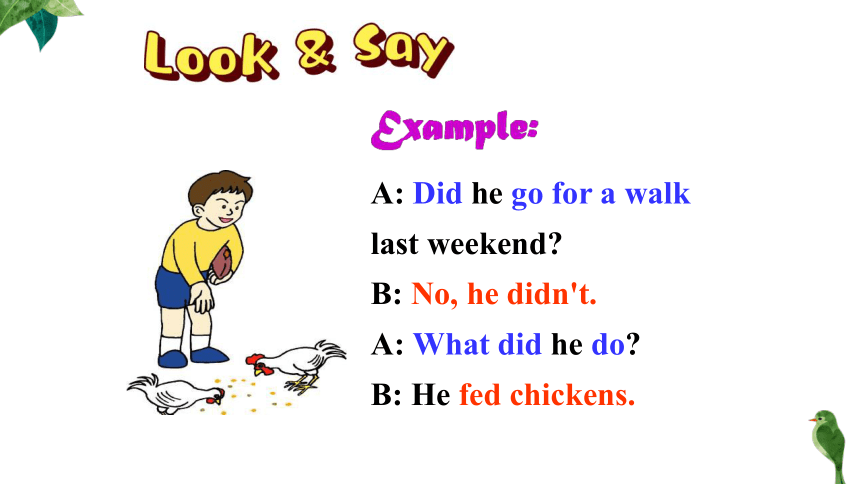
文档简介
(共35张PPT)
milk
cow
milk
a
cow
horse
ride
a
horse
feed
feed
chickens
farmer
quite
v.
挤奶
n.
奶牛
给奶牛挤奶
n.
马
骑马
v.
(fed/fed)喂养;
饲养
喂鸡
n.
农民;
农场主
adv.
相当;
完全
Words
&
phrases
review
quite
a
lot
(of
…)
anything
grow
farm
pick
excellent
countryside
in
the
countryside
许多
pron.
(常用于否定句或疑问句)任何东西;
任何事物
v.
(grew)种植;
生长;
发育
n.
农场
v.
务农;
种田
v.
采;
摘
adj.
极好的;
优秀的
n.
乡村;
农村
在乡下;
在农村
Words
&
phrases
review
Section
A
Period
One
We
use
the
simple
past
tense
to
talk
about
things
in
the
past.
am/is
(present)
→
was
(past)
are
(present)
→
were
(past)
Watch
Penelope's
story,
then
answer
the
questions.
Why
is
Penelope
so
excited?
Does
Penelope
have
a
good
time?
What
else
can
we
learn
from
the
cartoon?
______
(帮助)
each
other
_____
(玩)
together
___________
(分享食物)
with
each
other
__________
(打扫干净,清理)
to
protect
the
environment
play
help
share
food
clean
up
When
we
go
on
a
school
trip,
we
should
_______.
Carol
also
went
on
a
school
trip
yesterday.
一般过去时常表示过去某一时间发生的动作或存在的状态,常与yesterday,
last
week/month/year等表示过去的时间状语连用。
Look
at
the
pictures
and
guess
what
she
did.
1a
Match
the
phrases
with
the
pictures.
1.
went
for
a
walk
___
2.
milked
a
cow
__
3.
rode
a
horse
__
4.
fed
chickens
__
5.
talked
with
a
farmer
__
6.
took
some
photos
__
a
c
d
f
b
e
P61
1b
Listen
and
circle
the
three
things
Carol
did
on
her
school
trip
in
1a.
went
for
a
walk
milked
a
cow
rode
a
horse
fed
chickens
talked
with
a
farmer
took
some
photos
P61
1.
How
was
Carol's
school
trip?
2.
Did
she
go
to
the
zoo?
3.
Where
did
she
go?
4.
What
else
did
she
do?
It
was
great.
No,
she
didn't.
She
went
to
a
farm.
She
and
her
friends
went
for
a
walk
around
the
farm
and
talked
with
a
farmer.
Listen
again
and
answer
the
following
questions.
听力原文
1
2
3
4
一般过去时,含有行为动词的疑问句式
(1)一般疑问句:
__________+______+_____________?
(2)特殊疑问句:
_______+____+____+_____________?
助动词did
主语
行为动词原形
did
主语
行为动词原形
疑问词
肯定回答为:
___________
否定回答为:
___________
No,
I
didn't.
Yes,
I
did.
1c
Pairwork
Ask
and
answer
questions
about
Carol's
school
trip.
A:
Did
Carol
take
any
photos?
B:
Yes,
she
did.
A:
Did
Carol
ride
a
horse?
B:
No,
she
didn't.
…
P61
A:
Did
he
go
for
a
walk
last
weekend?
B:
No,
he
didn't.
A:
What
did
he
do?
B:
He
fed
chickens.
A:
Did
he
pick
some
strawberries
last
weekend?
B:
____________.
A:
______________?
B:
He
took
some
photos.
What
did
he
do
No,
he
didn't
A:
Did
he
__________
last
weekend?
B:
Yes,
he
did.
ride
a
horse
2a
Listen
and
check
(
)
the
questions
you
hear.
___
What
did
the
farmer
say?
___
Did
you
grow
any
apples?
___
What
did
you
see?
___
Do
they
grow
apples?
___
Did
you
learn
anything?
___
Did
you
eat
them?
___
Did
you
ask
him
any
questions?
___
Were
they
good?
P62
2b
Listen
again.
Circle
T
for
true
or
F
for
false.
1.
The
farmer
showed
Carol
around
the
farm.
T
F
2.
Carol
learned
a
lot
about
farming.
T
F
3.
The
farmers
grow
strawberries
from
December
to
June.
T
F
4.
The
farmers
don't
grow
apples.
T
F
5.
Carol
picked
some
strawberries
and
took
them
home.
T
F
P62
听力原文
1
2
3
4
5
Check
your
answers.
B:
She
picked
some
strawberries.
A:
What
did
Carol
do?
B:
She
talked
with
a
farmer.
A:___________________?
What
did
Carol
do
Pairwork
2c
Ask
and
answer
questions
about
Carol's
visit
to
the
farm.
P62
1.
How
was
Eric's
trip
last
week?
2.
What
did
he
do?
3.
How
was
the
weather
there?
4.
Did
Eric
watch
the
stars
at
night?
Read
the
conversation
in
2d,
then
answer
the
questions
below.
It
was
excellent.
He
went
fishing
every
day.
And
he
fed
the
chickens
with
his
grandpa.
It
was
great,
and
the
air
was
so
clean.
Yes,
he
did.
Fill
in
the
blanks
according
to
the
conversation
in
2d.
Eric
had
an
_________
trip
last
week.
He
______
his
grandparents
in
the
countryside.
He
_____
fishing
every
day
and
_____the
chickens
with
his
grandpa.
It
was
so
much
____.
The
weather
there
was______,
and
the
air
was
so
clean.
He
________
the
stars
at
night.
They
were
so
_________.
He
was
lucky.
excellent
went
fed
fun
great
watched
beautiful
visited
Peter:
Hi,
Eric.
你上星期的旅行如何?
Eric:
It
was
excellent.
我探望了乡下的爷爷奶
奶。
Peter:
Oh,
nice.
你都干什么了?
Eric:
I
went
fishing
every
day.
And
I
fed
the
chickens
with
my
grandpa.
那真是蛮好玩
的。
Peter:
Sounds
good.
那边天气如何?
Eric:
It
was
great,
and
the
air
was
so
clean.
夜晚
我会看星星,它们是那么美丽。
Peter:
你真幸运。
How
was
your
trip
last
week?
I
visited
my
grandparents
What
did
you
do?
It
was
so
much
How
was
the
weather
there?
I
fun.
watched
the
stars
at
night.
They
were
so
beautiful.
Lucky
you.
Read
the
dialogue
again
and
then
translate
the
Chinese
sentences
into
English.
in
the
countryside.
Translate
the
following
phrases
into
English.
1.
给奶牛挤奶
2.
骑马
3.
喂鸡
4.
散步
5.
拍照片
6.
与某人交谈
7.
带(某人)参观
8.
在乡下;
在农村
9.
去钓鱼
10.
听起来不错
milk
a
cow
ride
a
horse
feed
chickens
go
for
a
walk
take
photos
talk
with
sb.
show
sb.
around
in
the
countryside
go
fishing
sounds
good
1.
go
for
a
walk
Practise
He
went
for
a
walk
around
the
park,
to
get
some
air.
他绕着公园散了散步,呼吸些新鲜空气。
walk
n.
步行,行走
我们去散散步吧。
Let's
go
for
a
walk.
去散步
2.
milk
a
cow
milk
v.
挤……的奶;挤(奶)
1)
Farm
workers
milked
the
cows
by
hand.
农场工人们手工给奶牛挤奶。
2)
I
helped
to
milk
the
cows.
我帮忙挤牛奶。
Practise
你知道怎么挤牛奶吗?
Do
you
know
how
to
milk
a
cow?
给奶牛挤奶
3.
feed
chickens
feed
v.
给......提供食物;喂养
1)
Do
you
feed
your
chickens
corn?
你给鸡喂玉米吗?
2)
The
kids
love
feeding
bread
to
the
ducks.
孩子们喜欢给鸭子喂面包。
Practise
邻居不在家时,我经常替她喂猫。
I
usually
feed
the
neighbour's
cat
while
she's
away.
喂鸡
4.
Did
Carol
take
any
photos?
卡萝尔拍照了吗?
take与photo,picture等词搭配时,表示“拍摄;摄影”。表示“拍摄某物或人”,则要在短语后面接介词“of”引入所拍摄的对象。
Betty
took
a
photograph
of
us.
贝蒂给我们拍了一张相片。
Practise
她给孩子们照了很多相片。
She
took
lots
of
photos
of
the
kids.
5.
The
farmer
showed
Carol
around
the
farm.
这位农户带卡萝尔参观农场。
show
sb.
around
带(某人)参观
It's
very
nice
of
you
to
show
me
around
the
city.
你带我游览整个城市,真是太好了。
Practise
Let
me
know
when
you're
coming
to
Cambridge
and
I'll
show
you
around.
你来剑桥时请通知我,我会带你四处参观一下。
6.
I
went
fishing
every
day.
我每天都钓鱼。
go
fishing
钓鱼
1)
Will
you
go
fishing
with
me?
你能和我一起去钓鱼吗?
2)
It
was
Saturday.
Mr
Li
was
going
to
go
fishing.
那是个星期六,李先生打算去钓鱼。
Practise
我爸爸喜欢钓鱼。
My
dad
loves
to
go
fishing.
7.
It
was
so
much
fun.
那真是蛮好玩的。
fun表示“乐趣;快乐;享受”,为不可数名词。
1)
We
had
a
lot
of
fun
at
Sarah's
party.
我们在萨拉的聚会上玩得很开心。
2)
Have
fun!
玩个痛快!
Practise
小孩子玩得很开心。
The
children
were
having
so
much
fun.
8.
Lucky
you.
这是一句非正式口语,相当于You're
so
lucky.
Lucky之后的人称还可以改为me,
him等。
A:
There
was
no
power
at
school
last
night.
It
was
so
dark.
B:
Lucky
me.
I
was
not
there.
—
昨天晚上学校停电了,漆黑一片。
—
我多幸运啊,不在那里。
"I'm
going
to
France."
"Lucky
you!"
“我要去法国了。”“你运气真好!”
Practise
你真幸运。
Now
2
minutes
to
test
your
spelling.
Spelling
Bee
1.
English-Chinese
milk
horse
cow
farmer
quite
anything
2.
Chinese-English
喂养;种植,生长;采,摘;农场;
极好的,优秀的;乡村,农村;
When
finishing,
exchange
your
papers
to
see
who
does
the
best.
Review
go
for
a
walk
milk
a
cow
feed
chickens
take
photos
show
sb.
around
go
fishing
in
the
countryside
Ⅰ.
根据句意及首字母提示完成单词。
1.
I
don't
think
it
is
easy
to
m_____
a
cow.
2.
Don't
w_____.
Things
will
be
all
right.
3.
They
live
in
the
c__________,
far
away
from
the
city.
4.
Don't
p____
the
flowers
in
the
park,
please.
5.
The
farmers
g_____
all
kinds
of
vegetables
here.
ilk
orry
ountryside
ick
row
1.
We
saw
a
black
and
white
_____
on
the
farm.
2.
Tony
is
a
________
and
he
is
always
busy.
3.
Bob
is
drawing
a
picture
of
a
________.
4.
There
are
some
________
on
the
table.
5.
The
rain
stops
and
the
________
comes
out.
Ⅱ.
根据句意及图片提示,填入恰当的单词。
cow
farmer
horse
flowers
sun
Self-evaluation
1.
Can
you
ask
and
answer
questions
about
Carol's
visit
to
the
farm?
2.
Can
you
talk
about
past
events?
各个击破
1.
Make
a
dialogue
about
events
yesterday
with
your
partner.
2.
Preview
the
new
words
and
expressions
on
page
63.
milk
cow
milk
a
cow
horse
ride
a
horse
feed
feed
chickens
farmer
quite
v.
挤奶
n.
奶牛
给奶牛挤奶
n.
马
骑马
v.
(fed/fed)喂养;
饲养
喂鸡
n.
农民;
农场主
adv.
相当;
完全
Words
&
phrases
review
quite
a
lot
(of
…)
anything
grow
farm
pick
excellent
countryside
in
the
countryside
许多
pron.
(常用于否定句或疑问句)任何东西;
任何事物
v.
(grew)种植;
生长;
发育
n.
农场
v.
务农;
种田
v.
采;
摘
adj.
极好的;
优秀的
n.
乡村;
农村
在乡下;
在农村
Words
&
phrases
review
Section
A
Period
One
We
use
the
simple
past
tense
to
talk
about
things
in
the
past.
am/is
(present)
→
was
(past)
are
(present)
→
were
(past)
Watch
Penelope's
story,
then
answer
the
questions.
Why
is
Penelope
so
excited?
Does
Penelope
have
a
good
time?
What
else
can
we
learn
from
the
cartoon?
______
(帮助)
each
other
_____
(玩)
together
___________
(分享食物)
with
each
other
__________
(打扫干净,清理)
to
protect
the
environment
play
help
share
food
clean
up
When
we
go
on
a
school
trip,
we
should
_______.
Carol
also
went
on
a
school
trip
yesterday.
一般过去时常表示过去某一时间发生的动作或存在的状态,常与yesterday,
last
week/month/year等表示过去的时间状语连用。
Look
at
the
pictures
and
guess
what
she
did.
1a
Match
the
phrases
with
the
pictures.
1.
went
for
a
walk
___
2.
milked
a
cow
__
3.
rode
a
horse
__
4.
fed
chickens
__
5.
talked
with
a
farmer
__
6.
took
some
photos
__
a
c
d
f
b
e
P61
1b
Listen
and
circle
the
three
things
Carol
did
on
her
school
trip
in
1a.
went
for
a
walk
milked
a
cow
rode
a
horse
fed
chickens
talked
with
a
farmer
took
some
photos
P61
1.
How
was
Carol's
school
trip?
2.
Did
she
go
to
the
zoo?
3.
Where
did
she
go?
4.
What
else
did
she
do?
It
was
great.
No,
she
didn't.
She
went
to
a
farm.
She
and
her
friends
went
for
a
walk
around
the
farm
and
talked
with
a
farmer.
Listen
again
and
answer
the
following
questions.
听力原文
1
2
3
4
一般过去时,含有行为动词的疑问句式
(1)一般疑问句:
__________+______+_____________?
(2)特殊疑问句:
_______+____+____+_____________?
助动词did
主语
行为动词原形
did
主语
行为动词原形
疑问词
肯定回答为:
___________
否定回答为:
___________
No,
I
didn't.
Yes,
I
did.
1c
Pairwork
Ask
and
answer
questions
about
Carol's
school
trip.
A:
Did
Carol
take
any
photos?
B:
Yes,
she
did.
A:
Did
Carol
ride
a
horse?
B:
No,
she
didn't.
…
P61
A:
Did
he
go
for
a
walk
last
weekend?
B:
No,
he
didn't.
A:
What
did
he
do?
B:
He
fed
chickens.
A:
Did
he
pick
some
strawberries
last
weekend?
B:
____________.
A:
______________?
B:
He
took
some
photos.
What
did
he
do
No,
he
didn't
A:
Did
he
__________
last
weekend?
B:
Yes,
he
did.
ride
a
horse
2a
Listen
and
check
(
)
the
questions
you
hear.
___
What
did
the
farmer
say?
___
Did
you
grow
any
apples?
___
What
did
you
see?
___
Do
they
grow
apples?
___
Did
you
learn
anything?
___
Did
you
eat
them?
___
Did
you
ask
him
any
questions?
___
Were
they
good?
P62
2b
Listen
again.
Circle
T
for
true
or
F
for
false.
1.
The
farmer
showed
Carol
around
the
farm.
T
F
2.
Carol
learned
a
lot
about
farming.
T
F
3.
The
farmers
grow
strawberries
from
December
to
June.
T
F
4.
The
farmers
don't
grow
apples.
T
F
5.
Carol
picked
some
strawberries
and
took
them
home.
T
F
P62
听力原文
1
2
3
4
5
Check
your
answers.
B:
She
picked
some
strawberries.
A:
What
did
Carol
do?
B:
She
talked
with
a
farmer.
A:___________________?
What
did
Carol
do
Pairwork
2c
Ask
and
answer
questions
about
Carol's
visit
to
the
farm.
P62
1.
How
was
Eric's
trip
last
week?
2.
What
did
he
do?
3.
How
was
the
weather
there?
4.
Did
Eric
watch
the
stars
at
night?
Read
the
conversation
in
2d,
then
answer
the
questions
below.
It
was
excellent.
He
went
fishing
every
day.
And
he
fed
the
chickens
with
his
grandpa.
It
was
great,
and
the
air
was
so
clean.
Yes,
he
did.
Fill
in
the
blanks
according
to
the
conversation
in
2d.
Eric
had
an
_________
trip
last
week.
He
______
his
grandparents
in
the
countryside.
He
_____
fishing
every
day
and
_____the
chickens
with
his
grandpa.
It
was
so
much
____.
The
weather
there
was______,
and
the
air
was
so
clean.
He
________
the
stars
at
night.
They
were
so
_________.
He
was
lucky.
excellent
went
fed
fun
great
watched
beautiful
visited
Peter:
Hi,
Eric.
你上星期的旅行如何?
Eric:
It
was
excellent.
我探望了乡下的爷爷奶
奶。
Peter:
Oh,
nice.
你都干什么了?
Eric:
I
went
fishing
every
day.
And
I
fed
the
chickens
with
my
grandpa.
那真是蛮好玩
的。
Peter:
Sounds
good.
那边天气如何?
Eric:
It
was
great,
and
the
air
was
so
clean.
夜晚
我会看星星,它们是那么美丽。
Peter:
你真幸运。
How
was
your
trip
last
week?
I
visited
my
grandparents
What
did
you
do?
It
was
so
much
How
was
the
weather
there?
I
fun.
watched
the
stars
at
night.
They
were
so
beautiful.
Lucky
you.
Read
the
dialogue
again
and
then
translate
the
Chinese
sentences
into
English.
in
the
countryside.
Translate
the
following
phrases
into
English.
1.
给奶牛挤奶
2.
骑马
3.
喂鸡
4.
散步
5.
拍照片
6.
与某人交谈
7.
带(某人)参观
8.
在乡下;
在农村
9.
去钓鱼
10.
听起来不错
milk
a
cow
ride
a
horse
feed
chickens
go
for
a
walk
take
photos
talk
with
sb.
show
sb.
around
in
the
countryside
go
fishing
sounds
good
1.
go
for
a
walk
Practise
He
went
for
a
walk
around
the
park,
to
get
some
air.
他绕着公园散了散步,呼吸些新鲜空气。
walk
n.
步行,行走
我们去散散步吧。
Let's
go
for
a
walk.
去散步
2.
milk
a
cow
milk
v.
挤……的奶;挤(奶)
1)
Farm
workers
milked
the
cows
by
hand.
农场工人们手工给奶牛挤奶。
2)
I
helped
to
milk
the
cows.
我帮忙挤牛奶。
Practise
你知道怎么挤牛奶吗?
Do
you
know
how
to
milk
a
cow?
给奶牛挤奶
3.
feed
chickens
feed
v.
给......提供食物;喂养
1)
Do
you
feed
your
chickens
corn?
你给鸡喂玉米吗?
2)
The
kids
love
feeding
bread
to
the
ducks.
孩子们喜欢给鸭子喂面包。
Practise
邻居不在家时,我经常替她喂猫。
I
usually
feed
the
neighbour's
cat
while
she's
away.
喂鸡
4.
Did
Carol
take
any
photos?
卡萝尔拍照了吗?
take与photo,picture等词搭配时,表示“拍摄;摄影”。表示“拍摄某物或人”,则要在短语后面接介词“of”引入所拍摄的对象。
Betty
took
a
photograph
of
us.
贝蒂给我们拍了一张相片。
Practise
她给孩子们照了很多相片。
She
took
lots
of
photos
of
the
kids.
5.
The
farmer
showed
Carol
around
the
farm.
这位农户带卡萝尔参观农场。
show
sb.
around
带(某人)参观
It's
very
nice
of
you
to
show
me
around
the
city.
你带我游览整个城市,真是太好了。
Practise
Let
me
know
when
you're
coming
to
Cambridge
and
I'll
show
you
around.
你来剑桥时请通知我,我会带你四处参观一下。
6.
I
went
fishing
every
day.
我每天都钓鱼。
go
fishing
钓鱼
1)
Will
you
go
fishing
with
me?
你能和我一起去钓鱼吗?
2)
It
was
Saturday.
Mr
Li
was
going
to
go
fishing.
那是个星期六,李先生打算去钓鱼。
Practise
我爸爸喜欢钓鱼。
My
dad
loves
to
go
fishing.
7.
It
was
so
much
fun.
那真是蛮好玩的。
fun表示“乐趣;快乐;享受”,为不可数名词。
1)
We
had
a
lot
of
fun
at
Sarah's
party.
我们在萨拉的聚会上玩得很开心。
2)
Have
fun!
玩个痛快!
Practise
小孩子玩得很开心。
The
children
were
having
so
much
fun.
8.
Lucky
you.
这是一句非正式口语,相当于You're
so
lucky.
Lucky之后的人称还可以改为me,
him等。
A:
There
was
no
power
at
school
last
night.
It
was
so
dark.
B:
Lucky
me.
I
was
not
there.
—
昨天晚上学校停电了,漆黑一片。
—
我多幸运啊,不在那里。
"I'm
going
to
France."
"Lucky
you!"
“我要去法国了。”“你运气真好!”
Practise
你真幸运。
Now
2
minutes
to
test
your
spelling.
Spelling
Bee
1.
English-Chinese
milk
horse
cow
farmer
quite
anything
2.
Chinese-English
喂养;种植,生长;采,摘;农场;
极好的,优秀的;乡村,农村;
When
finishing,
exchange
your
papers
to
see
who
does
the
best.
Review
go
for
a
walk
milk
a
cow
feed
chickens
take
photos
show
sb.
around
go
fishing
in
the
countryside
Ⅰ.
根据句意及首字母提示完成单词。
1.
I
don't
think
it
is
easy
to
m_____
a
cow.
2.
Don't
w_____.
Things
will
be
all
right.
3.
They
live
in
the
c__________,
far
away
from
the
city.
4.
Don't
p____
the
flowers
in
the
park,
please.
5.
The
farmers
g_____
all
kinds
of
vegetables
here.
ilk
orry
ountryside
ick
row
1.
We
saw
a
black
and
white
_____
on
the
farm.
2.
Tony
is
a
________
and
he
is
always
busy.
3.
Bob
is
drawing
a
picture
of
a
________.
4.
There
are
some
________
on
the
table.
5.
The
rain
stops
and
the
________
comes
out.
Ⅱ.
根据句意及图片提示,填入恰当的单词。
cow
farmer
horse
flowers
sun
Self-evaluation
1.
Can
you
ask
and
answer
questions
about
Carol's
visit
to
the
farm?
2.
Can
you
talk
about
past
events?
各个击破
1.
Make
a
dialogue
about
events
yesterday
with
your
partner.
2.
Preview
the
new
words
and
expressions
on
page
63.
同课章节目录
- Unit 1 Can you play the guitar?
- Section A
- Section B
- Unit 2 What time do you go to school?
- Section A
- Section B
- Unit 3 How do you get to school?
- Section A
- Section B
- Unit 4 Don't eat in class.
- Section A
- Section B
- Unit 5 Why do you like pandas?
- Section A
- Section B
- Unit 6 I'm watching TV.
- Section A
- Section B
- Review of Units 1-6
- Unit 7 It's raining!
- Section A
- Section B
- Unit 8 Is there a post office near here?
- Section A
- Section B
- Unit 9 What does he look like?
- Section A
- Section B
- Unit 10 I'd like some noodles.
- Section A
- Section B
- Unit 11 How was your school trip?
- Section A
- Section B
- Unit 12 What did you do last weekend?
- Section A
- Section B
